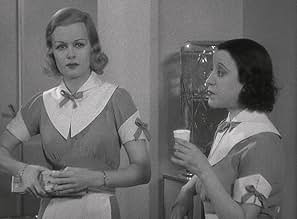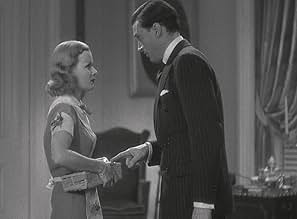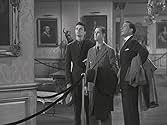IMDb RATING
6.5/10
1.3K
YOUR RATING
Sassy manicurist Eve Fallon is recruited as an even more brassy reporter and she helps police detective boyfriend Danny Barr break a jewel theft ring and solve the murder of a baby.Sassy manicurist Eve Fallon is recruited as an even more brassy reporter and she helps police detective boyfriend Danny Barr break a jewel theft ring and solve the murder of a baby.Sassy manicurist Eve Fallon is recruited as an even more brassy reporter and she helps police detective boyfriend Danny Barr break a jewel theft ring and solve the murder of a baby.
- Director
- Writers
- Stars
- Awards
- 2 wins total
Henry Brandon
- Don Butler
- (as Henry Kleinbach)
Fred Anderson
- Elevator Operator
- (uncredited)
William Arnold
- Customer
- (uncredited)
Mary Bovard
- Manicurist
- (uncredited)
Don Brodie
- Customer
- (uncredited)
Ralph Brooks
- Man Exiting Elevator
- (uncredited)
- Director
- Writers
- All cast & crew
- Production, box office & more at IMDbPro
Featured reviews
Big Brown Eyes would have been a big fat bomb if Cary Grant hadn't carried the movie. Even in such an early picture (1936) his debonair, yet cheeky gentleman style is evident. Playing a detective seemed odd, yet no matter what role he is cast in, he makes it his own. His romantic interest, Joan Bennett, seemed a tad too hard around the edges to play his girlfriend, but she did manage some decent repertoire with Grant, especially when the packing scene in Grant's apartment. Overall, the picture is uneven. It can't decide if it is a serious crime/drama or a light comedy. There is a scene where a stray bullet kills a baby (intimated) and there is nothing funny about that. Another scene a man is shot while arranging roses. It's incongruent action like these scenes that makes this movie just short of unwatchable. I have yet to see a Cary Grant movie that I didn't like, and this one seems a practice for his all out great flick His Gal Friday. Big Brown Eyes is watchable, only because of Cary Grant.
Mega-stardom for Cary Grant still was ahead of him when he made this amiable romantic mystery with Joan Bennett, though the film is still well worth watching and is one of the better films in this era. By 1937-1939 he was pretty much a household name, with films such as THE AWFUL TRUTH, HOLIDAY and GUNGA DIN to his credit (BRINGING UP BABY was perhaps the best of the films of this time period, but in 1938 it was a financial flop).
As for Joan, though much of the film I thought she was her sister Constance, as Joan died her hair platinum blonde for the film and she's best known as a raven-haired actress. It's amazing how much alike they look given the same hair styles. She, too, had better and more popular films in the future and so this film is one from both their transitional periods--clearly they were stars, but not of the first order.
The film is a wonderful blend of comedy, romance and mystery and is one of the better examples of this odd genre combination. While it isn't up to the tip-top standards of THE THIN MAN (but what was?), it was certainly a very good film. What I liked best was the writing for Joan's character. She was a wonderful 'broad'--a worldly and wise lady who had some of the best one-liners I've ever heard in a film of the era. She was enticing AND mouthy at the same time--whatta dame! The mystery involves an evil private detective (Walter Pidgeon) who is not above a lot of larceny in order to make it in his racket. Not only does he find stolen items, but he's not above having others killed or dealing with crooks to get it. During most of the film, Grant plays a police detective (an odd casting decision, I know) who is in love with Joan AND is assigned to a case involving Pidgeon--though at this point, no one knows he's "Mr. Big" behind everything evil and corrupt Grant is investigating. Throughout the investigation, Joan in the role of a reporter, does amazingly well in helping her boyfriend and even though they snipe at each other a bit, they are a great screen couple.
Overall, a delightful film that is close to earning an 8. Very well written and surprisingly good for an earlier Grant film.
As for Joan, though much of the film I thought she was her sister Constance, as Joan died her hair platinum blonde for the film and she's best known as a raven-haired actress. It's amazing how much alike they look given the same hair styles. She, too, had better and more popular films in the future and so this film is one from both their transitional periods--clearly they were stars, but not of the first order.
The film is a wonderful blend of comedy, romance and mystery and is one of the better examples of this odd genre combination. While it isn't up to the tip-top standards of THE THIN MAN (but what was?), it was certainly a very good film. What I liked best was the writing for Joan's character. She was a wonderful 'broad'--a worldly and wise lady who had some of the best one-liners I've ever heard in a film of the era. She was enticing AND mouthy at the same time--whatta dame! The mystery involves an evil private detective (Walter Pidgeon) who is not above a lot of larceny in order to make it in his racket. Not only does he find stolen items, but he's not above having others killed or dealing with crooks to get it. During most of the film, Grant plays a police detective (an odd casting decision, I know) who is in love with Joan AND is assigned to a case involving Pidgeon--though at this point, no one knows he's "Mr. Big" behind everything evil and corrupt Grant is investigating. Throughout the investigation, Joan in the role of a reporter, does amazingly well in helping her boyfriend and even though they snipe at each other a bit, they are a great screen couple.
Overall, a delightful film that is close to earning an 8. Very well written and surprisingly good for an earlier Grant film.
This little movie is more than forgotten. It is so mundane that no one has decided they can make a nickle from it, despite having some of the very same features and creative crew as projects that are celebrated. Cary Grant is about the same here, as in, say, "Charade."
I have to admit, it is flat. It all can be laid at the feet of the writer, I suppose.
These comedies are delicate. I suppose they cannot be engineered, like so much in film can. Oh, the execution can of course, but if the writer doesn't froth intuitively, nothing can spin it in after the fact.
But then again, this was the 30's where experimentation was the rule. And I suppose you need several failures before you get a "His Girl Friday" (which this resembles) out of so many tries.
Ted's Evaluation -- 1 of 3: You can find something better to do with this part of your life.
I have to admit, it is flat. It all can be laid at the feet of the writer, I suppose.
These comedies are delicate. I suppose they cannot be engineered, like so much in film can. Oh, the execution can of course, but if the writer doesn't froth intuitively, nothing can spin it in after the fact.
But then again, this was the 30's where experimentation was the rule. And I suppose you need several failures before you get a "His Girl Friday" (which this resembles) out of so many tries.
Ted's Evaluation -- 1 of 3: You can find something better to do with this part of your life.
Big Brown Eyes (1936)
*** (out of 4)
Detective Danny Barr (Cary Grant) is trying to track down some jewel thieves but one day he is given the grim news that a baby has been shot and killed in a park. He finds that the two crimes are connected but can't get any real clues until his girlfriend Eve (Joan Bennett) goes to work for a newspaper.
Yes, you heard the plot of BIG BROWN EYES correct. It's a movie that features a baby being shot and killed. That was a rather dark subject for any period of films but you have to wonder how that plot point got past the Hayes Office just a year after they were coming down on certain topics. Apparently a film with a baby being shot was okay as long as the male and female stars weren't kissing for over five seconds.
As far as the film goes, director and co-writer Raoul Walsh does a very good job at mixing several genres together and in the end they all work quite well. You've got the mystery of the jewel thieves and the baby murder. You've got the back and forth romance between Grant and Bennett. You've also got some comedy thrown in for good measure, although the killing of the baby is a tad bit dark for the rest of the picture. All of these elements work very well and it plays out quite nicely.
Grant was yet a major star but you can see the comic timing really starting to come out here. I've been going through his films in the order that he made them and this role was clearly one of the best of his early career. He got to play the tough cop and do it nicely but his comic and romantic timing is that classic Grant. Bennett is also very good in her supporting role and makes for some good charm and there's no question that the two leads have some nice chemistry. Walter Pidgeon, Lloyd Nolan and Joe Sawyer are also good in their supporting bits.
BIG BROWN EYES isn't all that well known, which is a tad bit shocking considering the cast, the director and the fact that it's a good movie. The film even has some fun with Grant having him play a ventriloquist. There's even more fun to be had when Bennett says a classic Mae West line to him.
*** (out of 4)
Detective Danny Barr (Cary Grant) is trying to track down some jewel thieves but one day he is given the grim news that a baby has been shot and killed in a park. He finds that the two crimes are connected but can't get any real clues until his girlfriend Eve (Joan Bennett) goes to work for a newspaper.
Yes, you heard the plot of BIG BROWN EYES correct. It's a movie that features a baby being shot and killed. That was a rather dark subject for any period of films but you have to wonder how that plot point got past the Hayes Office just a year after they were coming down on certain topics. Apparently a film with a baby being shot was okay as long as the male and female stars weren't kissing for over five seconds.
As far as the film goes, director and co-writer Raoul Walsh does a very good job at mixing several genres together and in the end they all work quite well. You've got the mystery of the jewel thieves and the baby murder. You've got the back and forth romance between Grant and Bennett. You've also got some comedy thrown in for good measure, although the killing of the baby is a tad bit dark for the rest of the picture. All of these elements work very well and it plays out quite nicely.
Grant was yet a major star but you can see the comic timing really starting to come out here. I've been going through his films in the order that he made them and this role was clearly one of the best of his early career. He got to play the tough cop and do it nicely but his comic and romantic timing is that classic Grant. Bennett is also very good in her supporting role and makes for some good charm and there's no question that the two leads have some nice chemistry. Walter Pidgeon, Lloyd Nolan and Joe Sawyer are also good in their supporting bits.
BIG BROWN EYES isn't all that well known, which is a tad bit shocking considering the cast, the director and the fact that it's a good movie. The film even has some fun with Grant having him play a ventriloquist. There's even more fun to be had when Bennett says a classic Mae West line to him.
An adequate comedy/mystery, one that is serviceable while playing but will scarcely be remembered long after it concludes. In all fairness, the jumbled screenplay by Bert Hanlon and director Raoul Walsh has a reasonable degree of intriguing ideas spread throughout the picture's scant runtime, but the various story threads never gel into a completely coherent picture and the film is further hindered by some woefully leaden dialogue among it's lead characters. The film is still wholly watchable, and even enjoyable during certain stretches due to it's lead performers. The chemistry between Cary Grant and Joan Bennett (as a bickering couple thrown into a case involving stolen jewels and murder) is breezy and natural, and the duo significantly better the film with their thoroughly winning performances.
Did you know
- TriviaAt 20 minutes, Eve Fallon (Joan Bennett) says to Danny Barr (Cary Grant), with a flirtatious wink, "if you happen to be around my way, come up and see me some time". This appears to refer to a famous, almost identical line said by Mae West to Cary Grant in "She Done Him Wrong" (1933), a playful in-joke that would have been obvious to contemporary audiences.
- Quotes
Richard Morey: Cortig, if you bought a gift for a girl and she refused to accept it, what would you do?
Russ Cortig: [with a slow smile] I'd give it to my wife.
- ConnectionsFeatured in The True Adventures of Raoul Walsh (2014)
- How long is Big Brown Eyes?Powered by Alexa
Details
- Runtime
- 1h 17m(77 min)
- Color
- Aspect ratio
- 1.37 : 1
Contribute to this page
Suggest an edit or add missing content


































